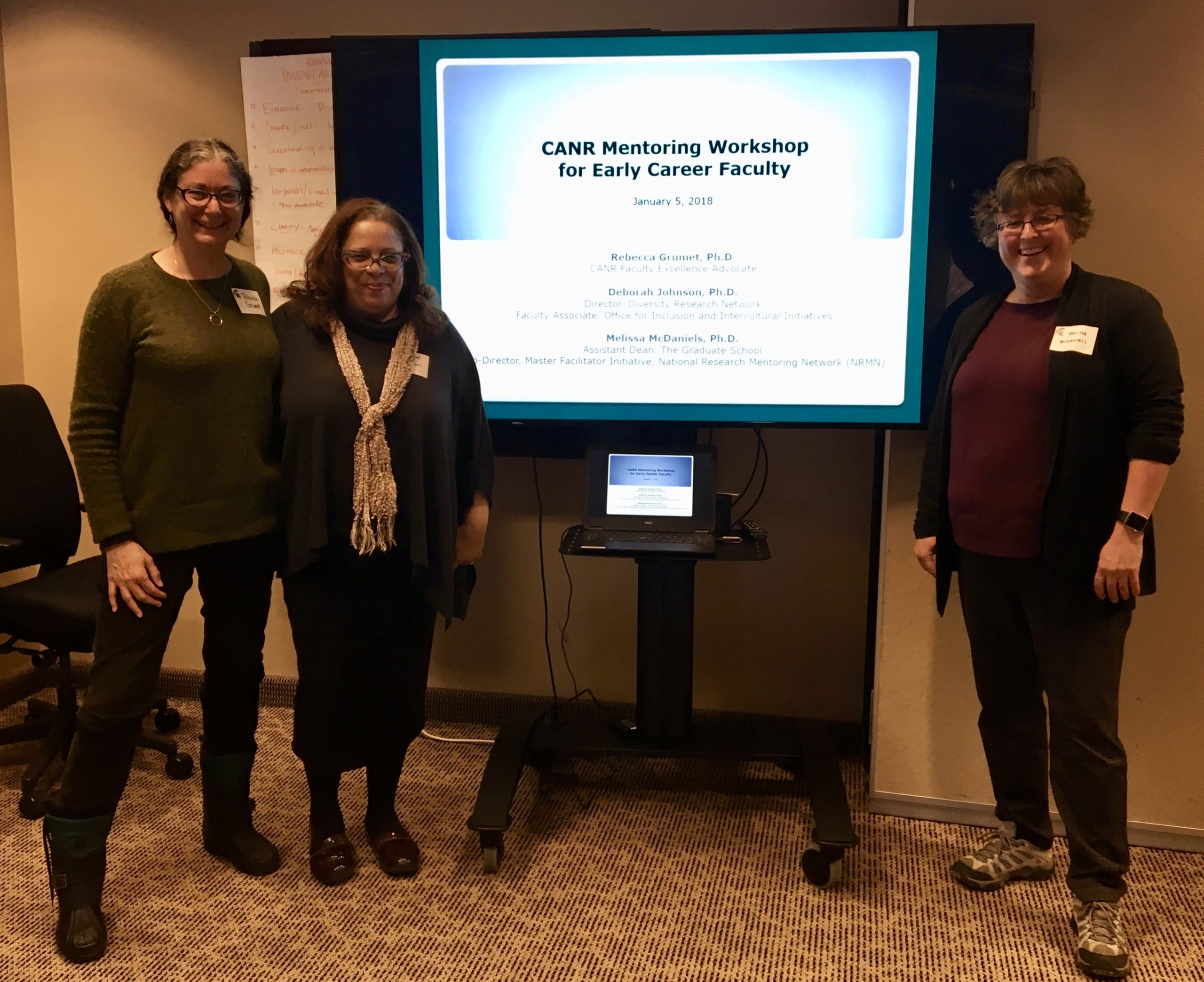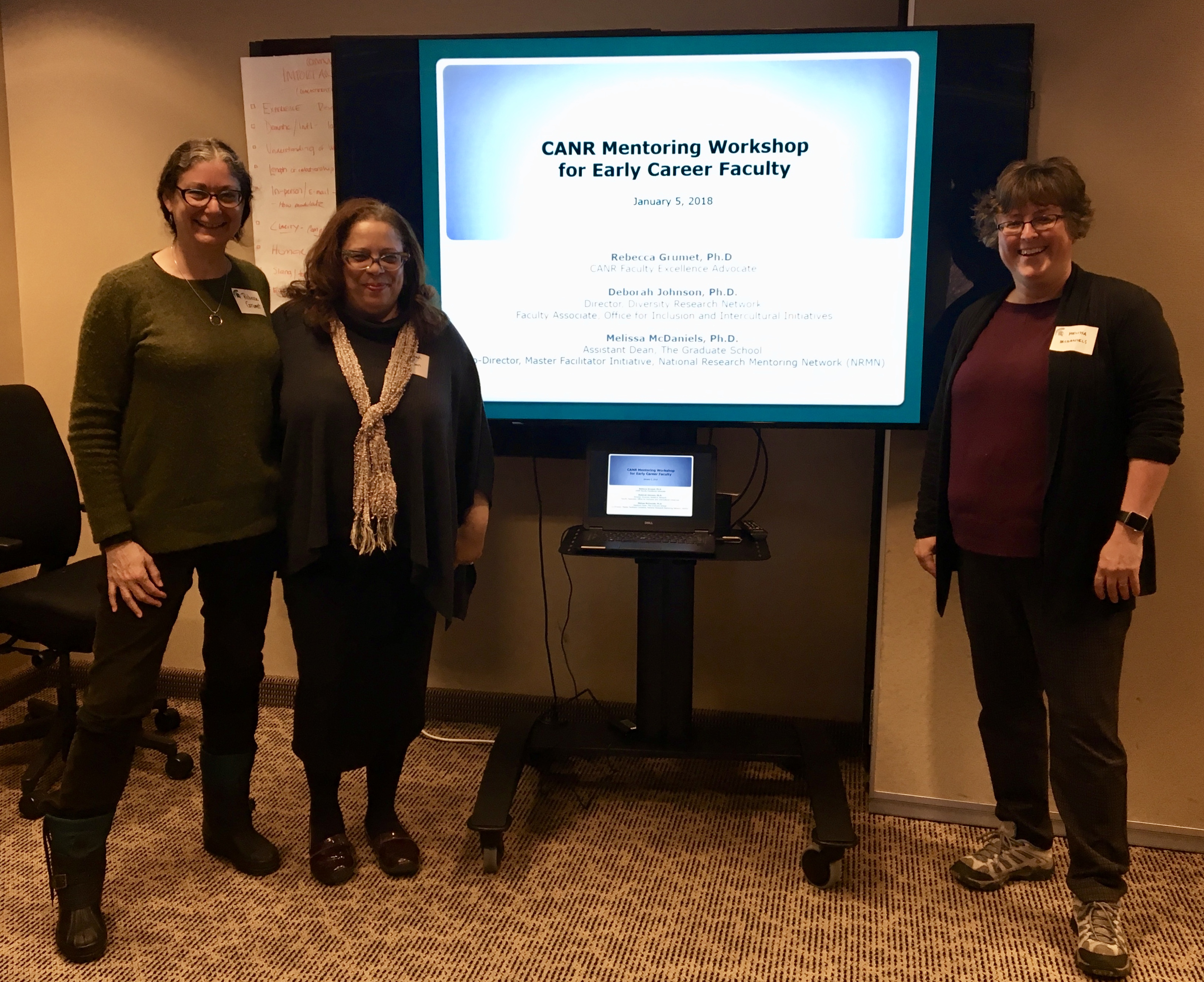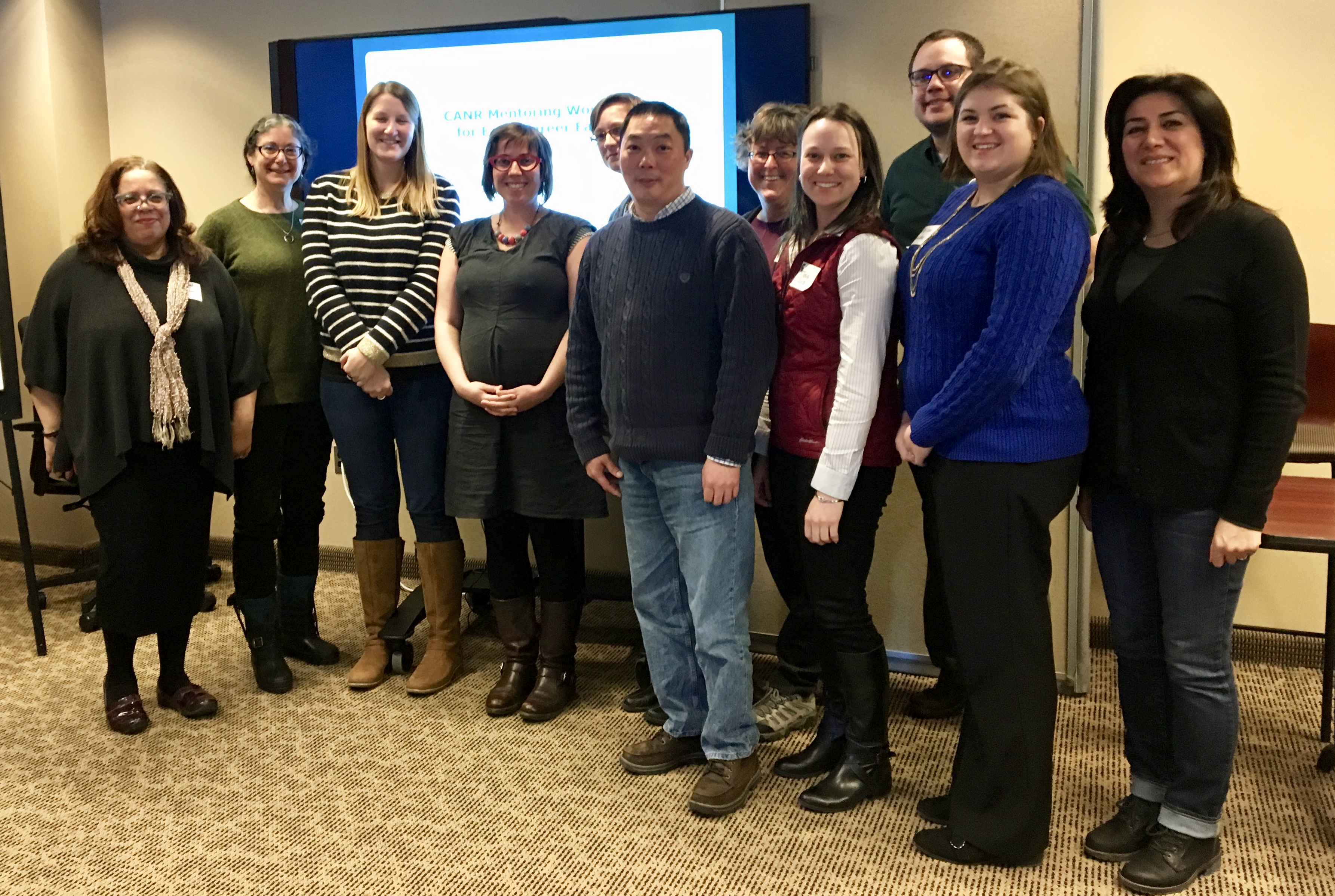
Written by Melissa McDaniels

Drs. Rebecca Grumet, Deborah Johnson, and Melissa McDaniels facilitate a mentoring workshop for early-career faculty at MSU in January 2018
Individuals and units at Michigan State University (MSU) have been leveraging and contributing to the resources and expertise of the National Research Mentoring Network (NRMN) since the inception of the grant in 2014. This mutually beneficial relationship has supported MSU’s efforts to increase institutional capacity to optimize culturally inclusive mentoring relationships among faculty, postdocs, graduate students, and undergraduates. MSU wanted to share some lessons learned about how to effectively engage with a national network such as NRMN, recognizing that the availability of human capital and the nature of an institution’s strategic priorities will influence engagement.
- Conduct an environmental scan of existing expertise, resources, and initiatives at your institution. The launch of a well-funded national initiative is a great opportunity to conduct an environmental scan of your campus resources and expertise. In the early months of NRMN, we noted MSU’s record of commitment to providing high-quality research experiences to a diverse undergraduate student body (through the NSF-REU Program, Summer Research Opportunities Program, Undergraduate Research Office, among others) and supporting the mentors of those undergraduates through programs organized through the Graduate School and Postdoctoral Office. As a former NSF ADVANCE Institutional Transformation Grant awardee, we also had a university-wide mentoring policy and mentoring toolkit. Once you identify your campus resources and expertise, you will be ready to consider ways that your institution can support a national network and vice versa.
- Contribute expertise to the national network. Once you conduct an environmental scan, think about ways individuals on your campus can contribute expertise to the national effort. Dr. Beronda Montgomery (MSU Foundation Professor, Biochemistry & Molecular Biology, Assistant Provost for Faculty Development-Research) served as a member of the NRMN Mentor Review and Development Committee. Dr. Antonio Nunez (Professor of Neuroscience, Graduate School Associate Dean, Postdoctoral Office Director) served as MSU’s liaison to NRMN’s Big Ten initiative (hereafter referred to as NRMN-CAN) and as a grant writing coach and instructor for their annual professional development and grant writing conferences. Dr. Diane Ebert-May (Professor of Plant Biology, Graduate Program Director) led a workshop on teaching and assessment for postdoctoral participants in NRMN-CAN. Dr. Melissa McDaniels (Assistant Dean, Graduate School) serves as co-director of NRMN’s Master Facilitator Initiative. McDaniels also led facilitator trainings and culturally aware mentor trainings at venues including the American Society for Microbiology, National Postdoctoral Association, Big Ten Academic Alliance, and NIH BUILD sites.
- Apply for supplemental funds through the national network. MSU received a mini grant from NRMN-CAN to support a workshop for graduate students and postdoctoral fellows at MSU called “Optimizing Mentoring Relationships to Promote Diversity and Research Excellence.” The six-hour workshop provided members of MSU’s NSF AGEP community (and others) with frameworks and tools to think about developing their skills as both mentors and mentees. Participants remarked that they learned about the importance of clearly communicating expectations in mentoring relationships, being aware of one’s own strengths and weaknesses as a mentor, and taking a “whole person” perspective when mentoring undergraduates.
- Encourage faculty and staff to attend professional development opportunities sponsored by the national network. One of NRMN’s strategies to build national capacity for high-quality and inclusive mentoring relationships is to train individuals to implement Entering Mentoring(mentor training curriculum) and Entering Research(mentee training curriculum) at their own institutions or organizations. As a result of funding that the Big Ten Academic Alliance received from NRMN, MSU was able to send 9 participants to facilitator training through NRMN-CAN in 2016-2018. Adding these to a list of individuals who completed facilitator training at other venues, MSU now has 12 individuals on campus trained to implement Entering Mentoring in their units.
- Implement resources locally from the national network. A variety of units at MSU started implementing components of the Entering Mentoring and/or Entering Research curricula as part of formal training and development programs or as periodic events hosted by departments and other units across campus. The Graduate School, Kellogg Biological Station, Beacon Center, College of Engineering, and the Institute for Cyber-Enabled Research are examples of units that have implemented these curricula. Implementation doesn’t need to mean an 8-hour workshop! Start small by facilitating a session as a part of a regular department brown-bag workshop, faculty meeting, or undergraduate seminar.
- Follow, learn from, and support trained facilitators as they do great things. The momentum that exists after participants return from facilitator training is palpable. For example, Dr. Katy Colbry (Assistant Dean, College of Engineering) adapted the entire Entering Mentoring curricula to meet the needs of her MSU graduate student mentors in engineering. She also saw the potential to disseminate high-quality mentoring practices through Tau Beta Pi, the national Engineering Honors Society. Tau Beta Pi provides training in communications, teamwork, and leadership to more than 4,000 engineering students and professionals each year through the Engineering Futures professional training program. Her team expanded the Engineering Futures curriculum to include an 8-hour training for engineering graduate students and research professionals adapted from Entering Mentoring. They also leveraged resources from Entering Research to develop a 4-hour module for engineering undergraduates that focuses on ethics, inclusion, and equity. In spring 2018, they trained 20 Engineering Futures facilitators with plans to make both of these trainings available nationwide in fall 2018.
-

Participants of a mentoring workshop for early-career faculty at MSU in January 2018